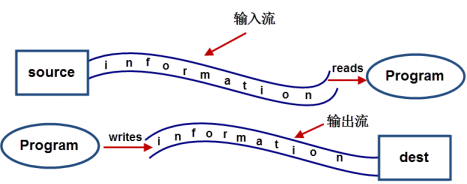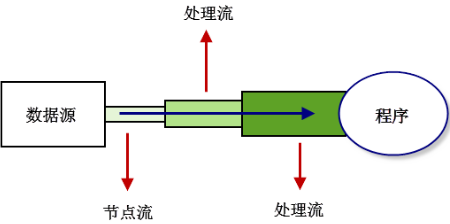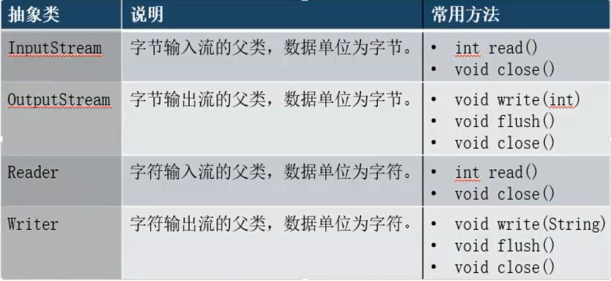IO
流是一个抽象、动态的概念,是一连串连续动态的数据集合。
Java中流的概念细分
1. 输入流:数据流向是数据源到程序(以InputStream、Reader结尾的流)。
2. 输出流:数据流向是程序到目的地(以OutPutStream、Writer结尾的流)。
按处理的数据单元分类:
1. 字节流:以字节为单位获取数据,命名上以Stream结尾的流一般是字节流,如FileInputStream、FileOutputStream。
2. 字符流:以字符为单位获取数据,命名上以Reader/Writer结尾的流一般是字符流,如FileReader、FileWriter。
Java中IO流类的体系
很多流都是成对出现的,比如:FileInputStream/FileOutputStream
1. InputStream/OutputStream:字节流的抽象类。
2. Reader/Writer:字符流的抽象类。
3. FileInputStream/FileOutputStream:节点流:以字节为单位直接操作“文件”。
4. ByteArrayInputStream/ByteArrayOutputStream:节点流:以字节为单位直接操作“字节数组对象”。
5. ObjectInputStream/ObjectOutputStream: 处理流:以字节为单位直接操作“对象”。
6. DataInputStream/DataOutputStream: 处理流:以字节为单位直接操作“基本数据类型与字符串类型”。
7. FileReader/FileWriter:节点流:以字符为单位直接操作“文本文件”(注意:只能读写文本文件)。
8. BufferedReader/BufferedWriter:处理流:将Reader/Writer对象进行包装,增加缓存功能,提高读写效率。
9. BufferedInputStream/BufferedOutputStream:处理流:将InputStream/OutputStream对象进行包装,增加缓存功能,提高 读写效率。
10. InputStreamReader/OutputStreamWriter: 处理流:将字节流对象转化成字符流对象。
11. PrintStream:处理流:将OutputStream进行包装,可以方便地输出字符,更加灵活。
四大IO抽象类
InputStream/OutputStream和Reader/writer类是所有IO流类的抽象父类
InputStream
int read():读取一个字节的数据,并将字节的值作为int类型返回(0-255之间的一个值)。如果未读出字节则返回-1(返回值为-1表示读取结束)。
void close():关闭输入流对象,释放相关系统资源。
OutputStream
void write(int n):向目的地中写入一个字节。
void close():关闭输出流对象,释放相关系统资源。
Reader
int read(): 读取一个字符的数据,并将字符的值作为int类型返回(0-65535之间的一个值,即Unicode值)。如果未读出字符则返回-1(返回值为-1表示读取结束)。
void close() : 关闭流对象,释放相关系统资源。
Reader
Writer用于写入的字符流抽象类,数据单位为字符。
void write(int n): 向输出流中写入一个字符。
void close() : 关闭输出流对象,释放相关系统资源。
理解IO操作步骤
* 1、创建源
* 2、选择流
* 3、操作
* 4、释放流

1 package boom.io; 2 3 import java.io.File; 4 import java.io.FileInputStream; 5 import java.io.FileNotFoundException; 6 import java.io.IOException; 7 import java.io.InputStream; 8 9 /** 10 * 理解IO操作步骤 11 * 1、创建源 12 * 2、选择流 13 * 3、操作 14 * 4、释放流 15 * @author Administrator 16 * 17 */ 18 public class IOTest1 { 19 20 public static void main(String[] args) { 21 // 1、选择流 22 File src = new File("abc.txt"); 23 // 2、选择流 24 try { 25 InputStream is = new FileInputStream(src); 26 // 3、操作(读取) 27 int data1 = is.read();// 第一个数据 28 int data2 = is.read();// 第二个数据 29 int data3 = is.read();// 第三个数据 30 int data4 = is.read();// 第四个数据 31 // 返回字节对应的ASCII吗 32 System.out.println(data1);// 97 33 System.out.println(data2);// 98 34 System.out.println(data3);// 99 35 System.out.println(data4);// 没有这个数据存在就返回-1 36 37 System.out.println(); 38 39 // 强转成字符 40 System.out.println((char)data1);// a 41 System.out.println((char)data2);// b 42 System.out.println((char)data3);// c 43 System.out.println((char)data4); 44 // 4、释放 45 is.close(); 46 47 } catch (FileNotFoundException e) { 48 e.printStackTrace(); 49 } catch (IOException e) { 50 e.printStackTrace(); 51 } 52 } 53 54 }
IO标准的步骤

1 package boom.io; 2 3 import java.io.File; 4 import java.io.FileInputStream; 5 import java.io.FileNotFoundException; 6 import java.io.IOException; 7 import java.io.InputStream; 8 9 /** 10 * 标准的IO流操作步骤 11 * 1、创建源 12 * 2、选择流 13 * 3、操作 14 * 4、释放流 15 * @author Administrator 16 * 17 */ 18 public class IOTest2 { 19 20 public static void main(String[] args) { 21 // 1、选择流 22 File src = new File("abc_1.txt"); 23 // 2、选择流 24 InputStream is = null; 25 try { 26 is = new FileInputStream(src); 27 // 3、操作(读取) 28 int temp; 29 while ((temp = is.read()) != -1) { 30 System.out.print((char) temp); 31 } 32 33 } catch (FileNotFoundException e) { 34 e.printStackTrace(); 35 } catch (IOException e) { 36 e.printStackTrace(); 37 } finally { 38 // 4、释放 39 try { 40 if (is != null) { 41 is.close(); 42 } 43 } catch (IOException e) { 44 e.printStackTrace(); 45 } 46 } 47 } 48 49 }
FileInputStream:文件字节输入节点流。通过字节的方式读取文件,适合读取所有类型的文件(图像、视频等),全字符一般用FileReader.

1 package boom.io; 2 3 import java.io.File; 4 import java.io.FileInputStream; 5 import java.io.FileNotFoundException; 6 import java.io.IOException; 7 import java.io.InputStream; 8 9 /** 10 * 文件字节输入流:FileInputStream,【分段读取】 1、创建源 2、选择流 3、操作 4、释放流 11 * 12 * @author Administrator 13 * 14 */ 15 public class IOTest3 { 16 17 public static void main(String[] args) { 18 /* // 1、创建源 19 File src = new File("abc.txt"); 20 // 2、选择流 21 InputStream fis = null;*/ 22 23 FileInputStream fis = null; 24 try { 25 fis = new FileInputStream("abc.txt"); 26 27 fis.skip(3);// 跳过n个字节开始读取 28 // 3、操作流【分段读取】 29 byte[] flush = new byte[1024*10];// 缓冲容器 30 int len = -1;// 接收长度 31 while ((len = fis.read(flush)) != -1) { 32 // 字节数组-->字符串(解码) 33 String str = new String(flush, 0, len); 34 System.out.println(str); 35 } 36 37 } catch (FileNotFoundException e) { 38 e.printStackTrace(); 39 } catch (IOException e) { 40 e.printStackTrace(); 41 } finally { 42 try { 43 if (fis != null) 44 fis.close(); 45 } catch (IOException e) { 46 e.printStackTrace(); 47 } 48 } 49 } 50 51 }
FileInputStream:文件字节输出节点流。通过字节的方式写出或者追加数据到文件,适合读取所有类型的文件(图像、视频等),全字符一般用FileWrite.

1 package boom.io; 2 3 import java.io.File; 4 import java.io.FileNotFoundException; 5 import java.io.FileOutputStream; 6 import java.io.IOException; 7 import java.io.OutputStream; 8 9 /** 10 * 文件字节输出流:FileOutputStream, 11 * 1、创建源 2、选择流 3、操作(写出内容) 4、释放流 12 * @author Administrator 13 * 14 */ 15 public class IOTest4 { 16 17 public static void main(String[] args) { 18 /*// 1、创建源 19 File dest = new File("dest.txt"); 20 // 2、选择流 21 OutputStream os = null;*/ 22 23 FileOutputStream fos = null; 24 try { 25 fos = new FileOutputStream("dest.txt",true);// 重复执行会在默认追加相同的内容。默认的为false 26 // 操作(写出) 27 String msg = "桃花坞里桃花庵,桃花庵下桃花仙;桃花仙人种桃树,又摘桃花卖酒钱。";// 需要写出的内容 28 // 字符串-->字节数组(编码) 29 byte[] datas = msg.getBytes(); 30 fos.write(datas, 0,datas.length); 31 fos.flush();// 刷新 32 } catch (FileNotFoundException e) { 33 e.printStackTrace(); 34 } catch (IOException e) { 35 e.printStackTrace(); 36 }finally{ 37 try { 38 if(fos != null) 39 fos.close(); 40 } catch (IOException e) { 41 e.printStackTrace(); 42 } 43 } 44 } 45 46 }
文件的拷贝

1 package boom.io; 2 3 import java.io.FileInputStream; 4 import java.io.FileNotFoundException; 5 import java.io.FileOutputStream; 6 import java.io.IOException; 7 8 /** 9 * 文件的拷贝:文件字节输入、输出流 10 * 11 * @author Administrator 12 * 13 */ 14 public class CopyFile { 15 16 public static void main(String[] args) { 17 copyfile("src\boom\io\CopyFile.java","copy.txt"); 18 19 } 20 21 private static void copyfile(String srcPath,String descPath) { 22 // 1、选择两个流。先输出,在输出 23 FileInputStream fis = null; 24 FileOutputStream fos = null; 25 try { 26 // 2、具体操作 p.png 拷贝成 pcopy.png 27 fis = new FileInputStream(srcPath);// 源头 28 fos = new FileOutputStream(descPath);// 目的地 29 // 3、分段读取内容 30 byte[] flush = new byte[1024 * 10]; 31 int len = -1; 32 while ((len = fis.read(flush)) != -1) { 33 fos.write(flush, 0, len);// 分段写出 34 } 35 fos.flush(); 36 37 } catch (FileNotFoundException e) { 38 e.printStackTrace(); 39 } catch (IOException e) { 40 e.printStackTrace(); 41 } finally { 42 // 4、分别关闭:先打开的后关闭 43 try { 44 if (fos != null) 45 fos.close(); 46 } catch (IOException e) { 47 e.printStackTrace(); 48 } 49 50 try { 51 if (fis != null) 52 fis.close(); 53 } catch (IOException e) { 54 e.printStackTrace(); 55 } 56 57 } 58 59 } 60 61 }
FileReader or FileWriter:文件字符输入、输出流

1 package boom.io; 2 3 import java.io.FileNotFoundException; 4 import java.io.FileReader; 5 import java.io.FileWriter; 6 import java.io.FilterReader; 7 import java.io.IOException; 8 import java.io.Writer; 9 10 /** 11 * 文件字符输入、输出流 12 * 13 * @author Administrator 14 * 15 */ 16 public class IOTest5 { 17 18 public static void main(String[] args) { 19 //TestFileReader(); 20 TestFileWrite(); 21 } 22 23 private static void TestFileWrite() { 24 FileWriter fw = null; 25 try { 26 fw = new FileWriter("abc.txt",true);// true不打开默认是false,删除原来内容重新写信的,true是追加 27 // 写法一 28 /** 29 String msg = "桃花坞里桃花庵,桃花庵下桃花仙;桃花仙人种桃树,又摘桃花卖酒钱。"; 30 char[] datas = msg.toCharArray(); 31 fw.write(datas, 0, datas.length); 32 */ 33 // 写法二 34 /** 35 String msg = "写法二,直接把要写出的字符扔进来"; 36 fw.write(msg); 37 */ 38 39 // 写法三 40 fw.append(" 开心!").append("就是笑"); 41 42 43 fw.flush(); 44 } catch (IOException e) { 45 e.printStackTrace(); 46 }finally{ 47 try { 48 if(fw != null) 49 fw.close(); 50 } catch (IOException e) { 51 e.printStackTrace(); 52 } 53 } 54 55 } 56 57 private static void TestFileReader() { 58 // 选择流:文件字符输入流 59 FileReader fr = null; 60 try { 61 fr = new FileReader("abc.txt"); 62 int len = -1; 63 // 字符缓冲器 64 char[] flush = new char[1024 * 10]; 65 while ((len = fr.read(flush)) != -1) { 66 String str = new String(flush, 0, len); 67 System.out.println(str); 68 } 69 } catch (FileNotFoundException e) { 70 e.printStackTrace(); 71 } catch (IOException e) { 72 e.printStackTrace(); 73 } finally { 74 try { 75 if (fr != null) 76 fr.close(); 77 } catch (IOException e) { 78 e.printStackTrace(); 79 } 80 } 81 } 82 }
字节数组:ByteArrayInputStream / ByteArrayOutputStream:节点流:以字节为单位直接操作“字节数组对象”。字节数组不要太大,释放资源可选处理。
